📝 Quick Summary
This comprehensive guide on hiring SBC developers highlights essential skills, sourcing strategies, and best practices for enhancing VoIP communication infrastructure. With expert developers, ensure secure, scalable, and efficient systems. Navigate the complexities of modern telecommunications confidently.
The demand for robust, secure, and scalable communication systems is paramount as enterprises transition from traditional telephony to VoIP. The role of SBCs has become increasingly critical. SBCs act as gatekeepers, ensuring the secure and efficient management of VoIP traffic. In 2026, the need for skilled SBC developers will be more significant than ever as businesses seek to optimize communication infrastructures. This comprehensive guide will delve into why you should hire SBC developers, the skills they should possess, and how to source and integrate them into your projects effectively.
Understanding SBC in Telecom
Session Border Controllers (SBCs) are essential components in modern telecommunications networks. They serve as intermediaries between VoIP networks, managing and securing voice and video traffic.
According to Enterprise Apps Today, The global VoIP market is expected to grow significantly, reaching an estimated value of USD 102.5 billion by 2026, with a Compound Annual Growth Rate (CAGR) of 3.8%.
SBCs provide a range of functionalities, including:
- Security: Protecting against threats such as Denial of Service (DoS) attacks, fraud, and eavesdropping.
- Interoperability: Ensuring seamless communication between disparate VoIP protocols and codecs.
- Quality of Service (quality of service): Prioritizing traffic to ensure high-quality voice and video calls.
- Regulatory Compliance: Enforcing policies and regulations specific to the telecommunications industry.
Given these tasks’ complexity and critical nature, hiring skilled SBC developers is crucial for any organization aiming to leverage VoIP technology effectively.
Why Hire SBC Developers?
Organizations increasingly rely on VoIP for communication, so the demand for specialized SBC developers has surged. Here are several compelling reasons why hiring SBC developers is a strategic move for any business looking to enhance its communication infrastructure:
1. Expertise in SBC Development
SBC developers bring specialized knowledge and expertise in designing, implementing, and maintaining SBC solutions. This expertise ensures that your communication systems are robust, efficient, and secure. An SBC developer understands the intricacies of VoIP protocols, network security, and interoperability, making them indispensable for developing reliable SBC solutions.
2. Customization and Scalability
Every organization has unique communication needs. Custom SBC development allows for tailored solutions that align with specific business requirements. Skilled SBC developers can design scalable systems that grow with your organization, ensuring your communication infrastructure can handle increasing traffic volumes and evolving technological demands.
3. Enhanced Security
Security is a major priority for any organization, and SBC developers are crucial to fortifying your VoIP infrastructure against potential vulnerabilities. They implemented security measures such as encryption, intrusion detection, and firewalling to protect against threats like Denial of Service (DoS) attacks, fraud, and eavesdropping.
4. Improved Quality of Service (QoS)
One of the primary functions of an SBC is to ensure high-quality voice and video calls. SBC developers optimize the Quality of Service (QoS) by prioritizing traffic, managing bandwidth, and mitigating packet loss and latency. It results in clear, uninterrupted communication, vital for business operations.
5. Regulatory Compliance
Telecommunications is a heavily regulated industry. SBC developers ensure that your communication systems comply with relevant regulations and standards. It includes implementing features for lawful interception, emergency calling, and privacy protection, helping your organization avoid legal issues and penalties.
6. Cost Savings
Investing in skilled SBC developers can lead to significant cost savings in the long run. By developing in-house SBC solutions, you reduce dependence on expensive third-party services. Additionally, efficient and well-maintained SBCs minimize downtime and reduce operational costs associated with troubleshooting and repairs.
7. Seamless Integration
SBCs often need to integrate with various network components and protocols. SBC developers have the expertise to ensure seamless interoperability between VoIP systems, legacy systems, and other network elements. This integration capability is crucial for maintaining smooth communication flows within your organization.
8. Future-Proofing Your Network
The telecommunications landscape continuously evolves, with new technologies and standards emerging regularly. SBC developers stay updated with the latest trends and advancements, ensuring your communication infrastructure is future-proof. They can implement flexible solutions that adapt to new protocols and technologies as they become available.
Hiring SBC developers is a strategic investment for any organization looking to optimize its VoIP infrastructure. Their expertise in SBC development, security, customization, and integration ensures that your communication systems are efficient and reliable but also secure and scalable.
Key Skills of SBC Developers
When hiring SBC developers, it is essential to look for professionals with a strong technical background and specific skills relevant to SBC development. Here are some critical skills to consider:
1. Proficiency in VoIP Protocols: Understanding SIP (Session Initiation Protocol), RTP (Real-time Transport Protocol), and other VoIP protocols is fundamental for SBC development.
2. Network Security Expertise: Knowledge of security protocols and practices to protect VoIP networks from threats.
3. Experience with Open Source SBC Solutions: Familiarity with SBC VoIP solutions such as FreeSWITCH, Kamailio SBC, and OpenSIPS can be advantageous.
4. Programming Skills: Proficiency in programming languages such as C, C++, Python, and Java for developing and customizing SBC solutions.
5. Knowledge of Network Architecture: Understanding the architecture of enterprise session border controllers and how they integrate with existing network infrastructure.
6. Problem-Solving Abilities: Strong analytical skills to troubleshoot and resolve complex issues in SBC deployment and maintenance.
By following these practical steps, you can hire skilled SBC developers who will significantly contribute to the success of your communication infrastructure projects.
Transform your communications now with top-tier SBC developers. Don’t miss out.

Steps to Hire SBC Developers
Hiring skilled SBC (Session Border Controller) developers involves several essential steps. This guide outlines the critical stages to ensure you find the right talent for your telecommunications projects.
- Define Your Requirements: Mention the scope of your project, the specific skills required, and the goals you aim to achieve with SBC development.
- Source Candidates: Utilize platforms like LinkedIn, GitHub, and specialized job boards to find qualified SBC developers. Consider leveraging SBC developer outsourcing services for a broader talent pool.
- Evaluate Expertise: Assess candidates based on their technical skills, experience with SBC development services, and familiarity with enterprise session border controllers.
- Conduct Technical Interviews: Use practical assessments and technical interviews to gauge candidates’ problem-solving abilities and proficiency in relevant technologies.
- Check References: Verify the candidate’s work history and seek feedback from previous employers to ensure their suitability for your project.
- Onboard and Integrate: Once hired, provide comprehensive onboarding to familiarize the developer with your systems and processes. Encourage collaboration with existing team members to ensure seamless integration.
By following these steps, you can effectively find and hire skilled SBC developers who will significantly contribute to the success of your telecommunications projects. Investing time and effort in this process ensures that your communication infrastructure is secure and capable of meeting your organization’s evolving needs.
Challenges and the Strategies to Overcome in Hiring SBC Developers
The specialized nature of SBC development, coupled with the rapid technological advancements in telecommunications, presents several obstacles for organizations seeking to enhance their VoIP infrastructure. Here are the key challenges you might face and strategies to overcome them:
1. High Demand for Specialized Skills
Challenge: The demand for SBC developers with specialized skills is high, making it difficult to find and attract top talent. These developers need a deep understanding of VoIP protocols, network security, and custom SBC solutions.
Solution: To address this challenge, consider offering competitive salaries, benefits, and professional development opportunities. Highlight the unique aspects of your projects and the potential for career growth to attract top talent. Additionally, leveraging specialized job boards and professional networks can help reach a targeted audience of skilled professionals.
2. Rapid Technological Advancements
Challenge: The telecommunications industry constantly evolves, with new protocols, standards, and security threats emerging regularly. SBC developers must stay updated with these changes to ensure that your communication systems remain efficient and secure.
Solution: Encourage continuous learning and offer access to training resources, certifications, and industry conferences. Creating a culture of creativity within the organization can help retain top talent and keep them engaged with the latest technological advancements.
3. Complexity of SBC Solutions
Challenge: SBC development involves complex tasks such as managing VoIP traffic, ensuring protocol interoperability, and implementing robust security measures. Finding developers with the necessary expertise and experience can be challenging.
Solution: Look for candidates with a strong foundation in VoIP protocols and network security. Practical assessments and technical interviews can help evaluate their problem-solving abilities and expertise in SBC development. Partnering with educational institutions and offering internships can also help cultivate future talent with the required skills.
4. High Cost of In-House Development
Challenge: Hiring and maintaining an in-house team of SBC developers can be expensive, especially for small and medium-sized enterprises. Salaries, benefits, and ongoing training contribute to the high cost of in-house development.
Solution: Consider outsourcing SBC development to specialized firms or freelance developers. Outsourcing can provide access to a broader talent pool at a lower cost. Ensure you work with reputable vendors and establish transparent communication and project management processes to maintain quality and security.
5. Geographical Limitations
Challenge: The talent pool for SBC developers might be limited in certain geographical regions, making it challenging to find qualified candidates locally. It can be a significant barrier for organizations that prefer in-house teams.
Solution: Embrace remote work and hire SBC developers from different regions. Remote work expands your talent pool and offers flexibility and cost savings. Implement robust remote work policies and tools to ensure effective communication and collaboration.
Organizations can successfully find and retain skilled SBC developers by understanding these challenges and implementing strategic solutions. Emphasizing continuous learning, embracing remote work, and offering competitive compensation can help overcome these obstacles and ensure your communication infrastructure remains robust, secure, and efficient.
Sourcing SBC Developers: In-House vs. Outsourcing
When sourcing SBC developers, organizations choose between in-house hiring and outsourcing. Each option has distinct advantages and challenges. This detailed comparison will help you decide based on your needs and circumstances.
In-House Hiring
Here are some of the Pros of In-House Hiring:
1. Greater Control: Managing an in-house team lets you directly oversee the development process, ensuring all tasks align with your organizational standards and project requirements. This control can lead to higher quality and more tailored solutions, as you can quickly address any issues and make real-time adjustments.
2. Deep Integration with Company Culture: In-house developers are more likely to understand and align with your company’s mission, values, and long-term objectives. This alignment fosters a work environment where team members are motivated and invested in the project’s success. It also facilitates better collaboration with other departments.
3. Long-Term Commitment: Hiring in-house developers increases loyalty and commitment to the organization. These developers are more likely to stay with the company long-term, reducing turnover rates and providing stability. They become integral parts of your team, gaining deep insights into your systems and processes.
Outsourcing SBC Development
Here are some of the Pros of Outsourcing SBC Development:
- Cost-Effective: Outsourcing SBC development can significantly reduce costs. You only pay for the services you need when you need them, without the additional overhead of salaries, benefits, and office space. This cost-effectiveness makes outsourcing attractive, especially for smaller companies or short-term projects.
- Flexibility and Scalability: Outsourcing allows you to scale your team up or down based on project requirements. This adaptability is useful for projects with fluctuating workloads or those requiring specialized skills that are not needed long-term. Outsourcing firms often have diverse experts who can be brought on board as required.
- Focus on Core Business: Delegating SBC development to an external team allows your internal staff to focus on core business activities. It can boost productivity and innovation within your organization, as the complexities of SBC development are manageable for your team.
Here are some of the Cons of In-House Hiring:
- Higher Costs: The costs associated with hiring full-time employees can be significant. In addition to competitive wages, you must account for advantages such as retirement plans, health insurance, and paid time off. These costs can add up, making in-house hiring a substantial financial commitment.
- Limited Talent Pool: Finding skilled SBC developers locally can be challenging, depending on your location. This limitation can restrict your ability to find the best candidates and may require additional resources for recruitment efforts. The talent pool for specialized roles like SBC development can be small in some regions.
- Scalability Issues: Scaling an in-house team quickly to meet the demands of a large or complex project can be difficult. Recruiting, hiring, and training new employees takes time, which can delay project timelines and increase costs. Rapidly adjusting team size to match project needs is often more challenging with an in-house setup.
Choosing between in-house hiring and outsourcing for SBC development involves carefully weighing the pros and cons of each approach. By considering your unique project requirements, budget, and long-term objectives, you can choose a strategy that best supports your company’s goals and guarantees the effective creation and implementation of your SBC solutions.
Enhance your VoIP security and performance with our specialized SBC development team.
Comparison between In-House and Outsourcing SBC Developers
| Criteria | In-House Hiring | Outsourcing |
| Control | Direct oversight and real-time adjustments | Less direct control requires robust project management |
| Integration with Culture | Deep integration, and alignment with company goals | External teams may not fully align with company culture |
| Commitment | Long-term loyalty and stability | Flexible and scalable, but less long-term commitment |
| Costs | Higher costs, including salaries, benefits, and training | Cost-effective, paying only for services needed |
| Talent Pool | Limited to local candidates | Access to a global talent pool |
| Scalability | Challenging to scale quickly, requires significant resources | Highly flexible and scalable based on project needs |
| Focus on Core Business | Internal team may be diverted by development tasks | Allows internal team to focus on core business activities |
| Communication | Easier and more immediate communication | Potential barriers due to time zones and cultural differences |
| Security | Higher control over data security | Potential risks require robust data protection measures |
Best Practices for Custom SBC Development
We offer Custom Session Border Controller (SBC) development services for the Telecom industry. It requires meticulous planning, implementation, and continuous improvement to ensure robust and efficient VoIP communication systems. Here are some best practices to follow for successful custom SBC development:
- Conduct Thorough Needs Analysis: Before starting development, analyze your organization’s communication needs and goals. This will help define the scope/objectives of the SBC solution.
- Focus on Security: Prioritize security features to protect against VoIP-specific threats such as call fraud, eavesdropping, and DoS attacks.
- Ensure Interoperability: Develop SBC solutions that can seamlessly integrate with various VoIP protocols, codecs, and network devices.
- Implement Quality of Service (QoS): Design SBCs to prioritize traffic and maintain high-quality voice and video calls, especially during peak usage.
- Test Rigorously: Conduct extensive testing to identify and resolve issues before deployment. It includes stress testing, security testing, and interoperability testing.
- Plan for Scalability: Develop SBC solutions that scale with your organization’s growth and evolving communication needs.
By following these best practices, you can develop custom SBC solutions that are secure, interoperable, and scalable, ensuring efficient and high-quality VoIP communication. Conducting thorough needs analysis, focusing on security, ensuring interoperability, implementing quality of service, testing rigorously, planning for scalability, maintaining documentation, and providing training and support are critical steps for successful SBC development.
Cost Considerations for Hiring SBC Developers
The cost of hiring SBC developers can vary based on location, experience, and the project’s complexity. Here’s a breakdown of potential cost considerations:
- Salaries: In-house SBC developers typically command higher wages, especially those with extensive experience and specialized skills. Depending on the region and expertise, salaries can range from $80,000 to $150,000 per year.
- Outsourcing Costs: Outsourcing SBC development can be more cost-effective, with rates varying based on the developer’s location. For example, developers in Eastern Europe or Asia may charge between $30 to $70 per hour, whereas developers in Europe/North America may charge $100 to $200 per hour.
- Training and Development: It can be more expensive, but investing in your SBC developers’ continuous training and development will guarantee that they are knowledgeable about the newest technology trends and industry best practices.
- Tools and Resources: It is crucial to provide developers with the necessary tools, software, and resources for SBC development to increase productivity and efficiency.
By carefully analyzing these cost considerations and aligning them with your organizational goals, you can make an informed decision that best supports your SBC development needs and overall business strategy.
Emerging Trends in SBC Development
As we move further into 2026, several trends are shaping the future of SBC development:
- Cloud-Based SBCs: The shift towards cloud computing has led to the development of cloud-based SBC solutions, offering greater flexibility, scalability, and cost savings.
- Artificial Intelligence (AI) and Machine Learning (ML): Integrating AI and ML into SBCs enhances their ability to detect and mitigate security threats, optimize traffic management, and improve overall performance.
- 5G Integration: With the rollout of 5G networks, SBCs are designed to handle the increased data traffic and provide seamless connectivity for next-generation communication services.
- Improved Security Features: SBC developers focus on implementing advanced security features such as end-to-end encryption, anomaly detection, and real-time threat intelligence.
- Automation and Orchestration: Automation tools and orchestration frameworks streamline the deployment and management of SBCs, reduce operational complexity, and improve efficiency.
The emerging trends in SBC development highlight the ongoing evolution of technology and the need for more intelligent, secure, and flexible communication solutions. Cloud-based SBCs, AI and ML integration, 5G readiness, enhanced security features, automation and orchestration, increased focus on interoperability, and advanced analytics are shaping the future of SBCs. By staying informed about these trends, organizations can better prepare for the future, ensuring their VoIP infrastructure remains robust, secure, and capable of meeting the demands of modern communication networks.
Securing Future Communications: The Strategic Importance of Hiring Skilled SBC Developers
Hiring skilled SBC developers in 2026 is crucial for organizations looking to optimize their VoIP infrastructures and ensure secure, high-quality communication. By understanding the essential skills required, sourcing the right talent, and following best practices, businesses can successfully develop and maintain robust SBC solutions. Whether you hire in-house or outsource the development, the expertise of hiring SBC developers will be instrumental in navigating the complexities of modern telecommunications. However, if you need help with SBC, connect with developers and highly experienced experts to understand your business’ custom solution!


